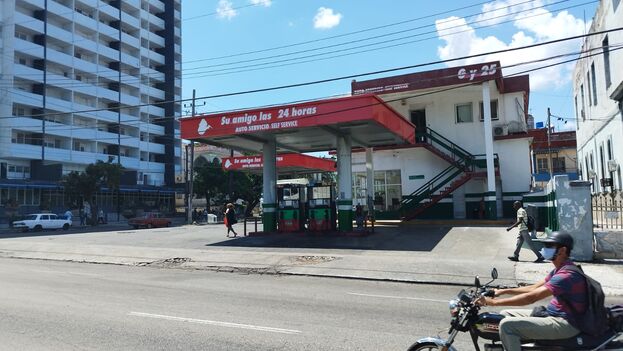
![]() 14ymedio, Juan Diego Rodríguez, Havana, 3 April 2023 — Havana faces restrictions due to fuel shortages for the umpteenth time. According to the website OnCuba from the State newspaper Granma — which this Monday again experienced “technical failures” and could only be partly accessed — the provincial government will establish new measures to face “a situation created by the lack of supply of fuel for private carriers and individuals with financial means in this sector.”
14ymedio, Juan Diego Rodríguez, Havana, 3 April 2023 — Havana faces restrictions due to fuel shortages for the umpteenth time. According to the website OnCuba from the State newspaper Granma — which this Monday again experienced “technical failures” and could only be partly accessed — the provincial government will establish new measures to face “a situation created by the lack of supply of fuel for private carriers and individuals with financial means in this sector.”
Thus, the official press says, “the fuel figures allocated to vital activities will be readjusted”; that is, a limit will be imposed on buying, and the sale of fuel will be offered in four service stations “located to the east, west, center and south of the city.”
The authorities do not offer the names of these gas stations but report that they will be open “in the early hours of the morning to provide services to the population.”
There will also be limits on the amount allowed according to the type of vehicle, although at the moment they have not specified the quota assigned to each one.
The lack of fuel is evident in Havana because there is insufficient transportation and garbage collection. This Monday the streets looked emptier than ever, and even on avenues as central as 23rd, minutes went by without a car being seen.
Several gas stations, like the ones at G and 25th and L and 17th, where there are usually long lines of vehicles, were without service because there was neither gas nor diesel for sale. “They are both gone,” complained a driver to 14ymedio. “I’m paying for fuel at 50 and 60 pesos [$2-2.50] a liter [roughly a quarter of a gallon] on the street because I’m not there to wait in line.” The price in the official establishments is around 30 pesos [$1.25] per liter.
Other provinces have been suffering cuts for weeks. In Villa Clara, for example, fuel was rationed at the beginning of March, at a maximum of 30 liters [7.5 gallons] per car, 20 liters [5 gallons] for cargo and passenger bikes and 10 liters [2.5 gallons] for motorcycles.
In the middle of the month, just after a visit by Raúl Castro to Caracas, Reuters reported that Venezuela was preparing to send more than one and a half million barrels of oil to Cuba in a supertanker with the Panamanian flag. The cargo was composed, according to the report, of 400,000 barrels of Venezuelan oil and 1.13 million barrels of diesel.
The ship was supposed to arrive on the Island at the end of March, but there is no trace of that cargo on the streets.
Meanwhile, one group of workers especially outraged about the shortage of fuel are the taxi drivers. Sources in this newspaper say that they are fighting to be enabled by special services so that they don’t have to stand in the same lines as the rest, including the private ones. “So far we are having to gather together several taxi drivers to take turns standing in line, but we can’t continue that way,” says one of them.
Translated by Regina Anavy
____________
COLLABORATE WITH OUR WORK: The 14ymedio team is committed to practicing serious journalism that reflects Cuba’s reality in all its depth. Thank you for joining us on this long journey. We invite you to continue supporting us by becoming a member of 14ymedio now. Together we can continue transforming journalism in Cuba.
